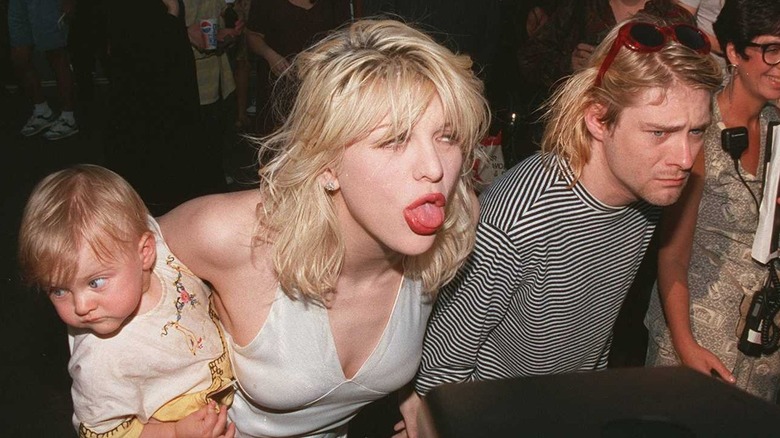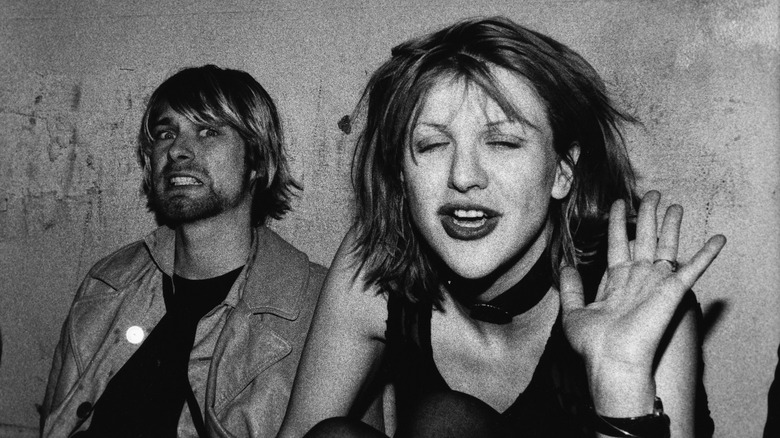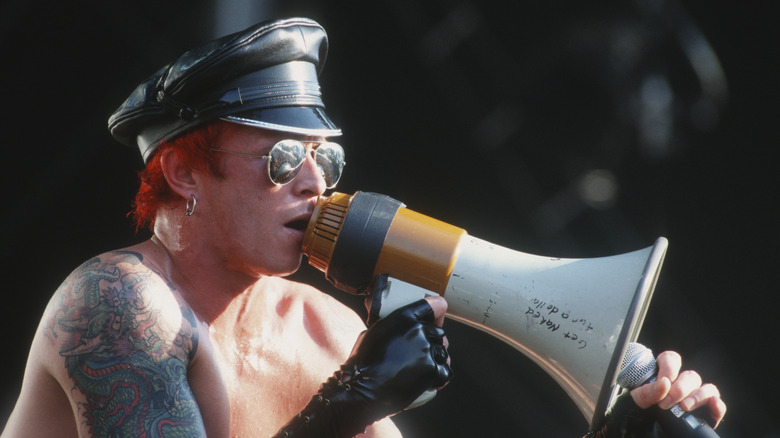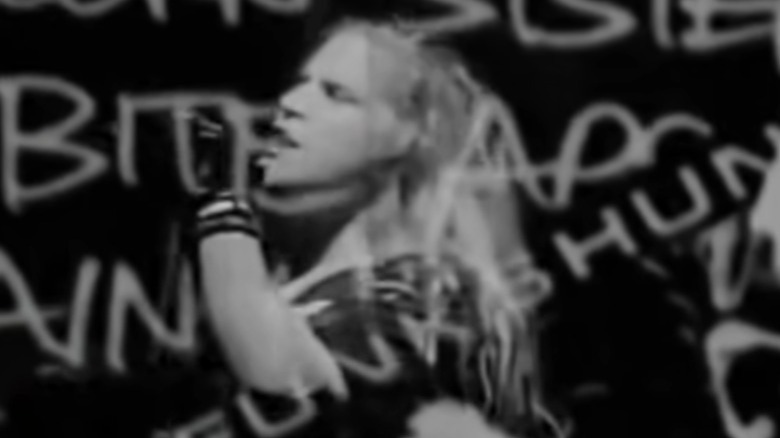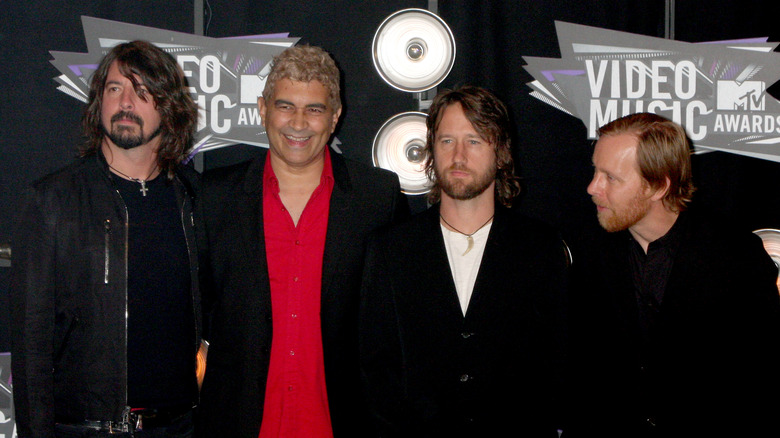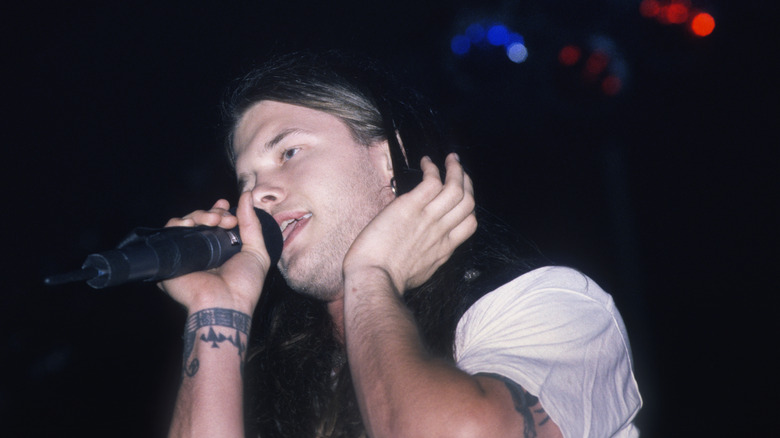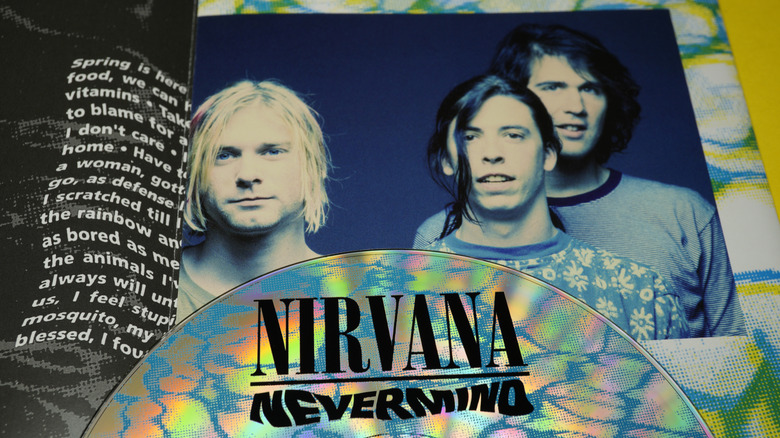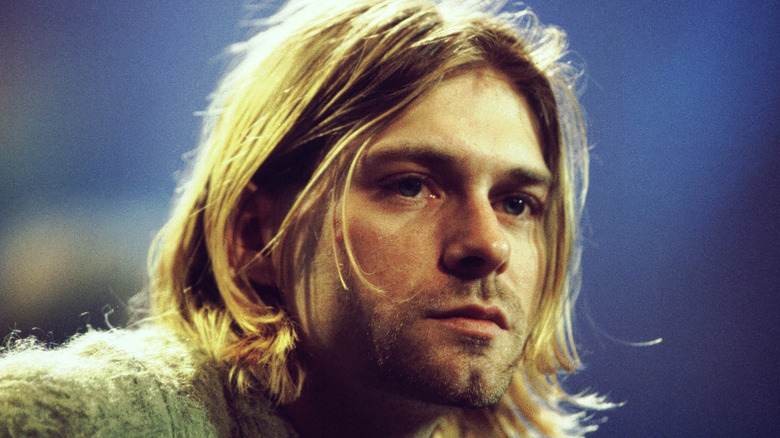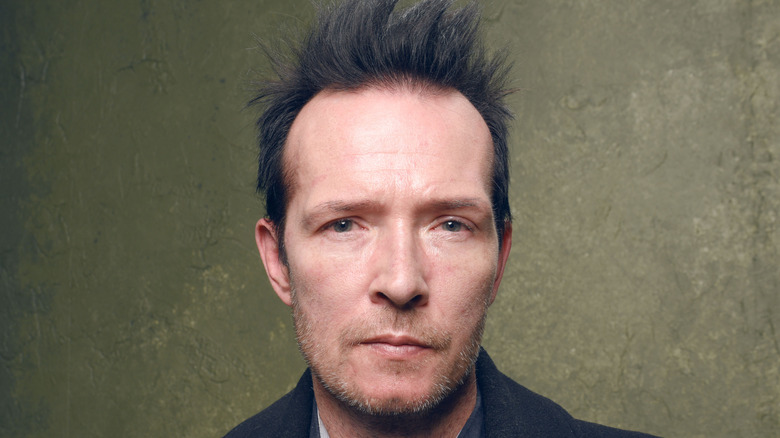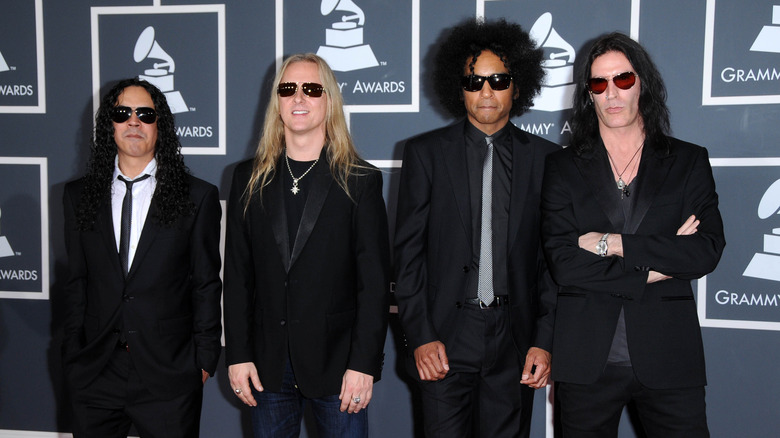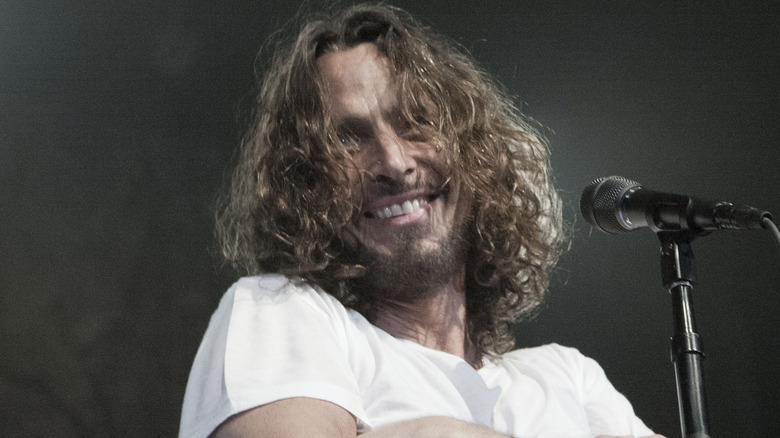The Biggest Scandals To Ever Hit Grunge Music
When Seattle record company Sub Pop used the term "grunge" to describe Green River's music in 1988, they put it in a phrase: "ultra-loose GRUNGE that destroyed the morals of a generation" (via The Guardian). Little did they know this would inspire a huge movement that would assume both the murky guitar sound and self-destructive behavior. Grunge music started a revolution defined by simpler fashion (forget yellow spandex and mullets), unruly sounds, and self-reflective lyrics with deep themes like social alienation and trauma.
But as the grunge scene brought inspiration (and arguably hope) to thousands of people, its bands were ridden with scandals, drug use, and death. From Nirvana's Kurt Cobain to Soundgarden's Chris Cornell, grunge has also seen several instances of suicide and overdoses — even more tragically, overdoses that came not from a hedonistic lifestyle but from the very vulnerability that grunge lyrics explore (via Louder). Here are some of the biggest scandals to ever hit grunge music (and the many people involved in it).
The following article contains descriptions of addiction and suicide.
Kurt Cobain and Courtney Love's self-destructive relationship
Kurt Cobain met Courtney Love in 1991, the same year he was struggling to deal with the worldwide fame Nirvana's second album "Nevermind" brought him. Four months into their relationship, Love was pregnant, and on February 24, 1992, the two got married in Hawaii (via Biography). Soon enough, they were pictured as another perfect rockstar couple — but as Vanity Fair's Lynn Hirschberg suggested they were less the John and Yoko of grunge and more "the next Sid and Nancy."
Indeed, Kurt Cobain and Love's relationship was defined by drug use and emotional turbulence, both encouraging the other's self-destructive behavior. As Love said two years before her husband's suicide in 1994, "We did a lot of drugs. We got pills and then we went down to Alphabet City ... and we copped some dope. Then we got high and went to SNL. After that, I did heroin for a couple of months." It turns out Love did heroin while she was pregnant — after the Vanity Fair article was released, the couple temporarily lost custody over baby Frances Bean Cobain. Kurt Cobain's conflicted relationship with fame (as reported by Time) only increased his depression, and his tumultuous, drug-fueled relationship with Love was a catalyst to him taking his life.
Stone Temple Pilots' Sex Type Thing was gravely misinterpreted
Seattle might have been the main grunge scene (plane tickets to Seattle and Portland were once sold out in 1992, says Vanity Fair), but when Stone Temple Pilots came along, people turned their eyes to San Diego. While the band's debut album "Core" was an instant success in the United States, their first single was the source of a big controversy. "Sex Type Thing" is written from the perspective of a sexual offender, so many listeners assumed STP were glorifying rape.
However, this couldn't have been more wrong. STP frontman Scott Weiland was a proud feminist — as bassist Robert DeLeo confirmed with Rolling Stone, "Scott was very much against [sexual assault]. ... But once it's out there, it's out of your hands and everybody takes it the way they want to." Weiland himself admitted in a 1993 interview with Rolling Stone (via Below Empty): "I never thought that people would ever seriously think that I was an advocate of date rape." He added that "Sex Type Thing" emphasized the mindset of the "typical American macho jerk."
If you or anyone you know has been a victim of sexual assault, help is available. Visit the Rape, Abuse & Incest National Network website or contact RAINN's National Helpline at 1-800-656-HOPE (4673).
Andrew Wood's heroin overdose was the first of many
In 1990, Andrew Wood was the former frontman of Malfunkshun, one of the very first Seattle grunge bands. He'd recently formed another band, Mother Love Bone (together with future Pearl Jam members Jeff Ament and Stone Gossard) and was working on the band's debut album, "Apple" (via Live For Live Music).
The album was scheduled to be released in March 1990 — the same month, Wood fell into a coma from a heroin overdose. He died three days later, in a hospital. His roommate, Soundgarden frontman Chris Cornell, created another band — Temple of the Dog — as a tribute to Wood. Several grunge musicians came together for this project, as well as other attempts at honoring Wood.
But there are tragic undertones to this story. Seattle grunge bands were ridden by substance abuse and untimely deaths throughout the 1990s. Wood's overdose death brought grunge musicians together, but it can also be seen as a catalyst for all the tragedy that was to follow.
If you or anyone you know is struggling with addiction issues, help is available. Visit the Substance Abuse and Mental Health Services Administration website or contact SAMHSA's National Helpline at 1-800-662-HELP (4357).
Foo Fighters once supported AIDS denialists
In the late 1990s, Foo Fighters bassist Nate Mendel read a book titled "What If Everything You Thought You Knew About AIDS Was Wrong?" It was written by Christine Maggiore, the founder of the Alive and Well organization, which denies the link between HIV and AIDS. Mendel was deeply inspired by this book and convinced the rest of the band to support Maggiore's fringe organization. In January 2000, Foo Fighters held a benefit concert for them and even added the following statement to their website (via MTV): "The current thinking on AIDS is in serious need of reconsideration."
As The Monthly details, around the same time, South African President Thabo Mbeki banned antiretroviral drugs in hospitals (as he also denied the link between HIV and AIDS) and was subsequently blamed for hundreds of thousands of deaths. Foo Fighters' association with AIDS denialists caused a huge backlash from fans and specialists alike, and they were urged to reconsider their allegiance. Mendel continued to speak out, but the evidence was overwhelming, and the band eventually decided to cut ties with Alive and Well. Sadly Maggiore's 3-year-old daughter died from AIDS-related pneumonia, then Maggiore, still refusing treatment, died of the same cause.
Foo Fighters members have never spoken publicly about their grave mistake, but Dave Grohl's support of Elton John's AIDS Foundation speaks out.
Courtney Love sued Nirvana
In 1997, three years after Kurt Cobain's death, remaining Nirvana members Dave Grohl and Krist Novoselic formed the Nirvana LLC partnership with Love. The contract didn't sit well with Cobain's widow Courtney Love. In 2001, she sued Grohl and Novoselic over ownership of the band, claiming her late husband was equivalent to Nirvana (via MTV). Love (who, according to the Los Angeles Times, was also part of a scandalous lawsuit against Universal Music Group at the time) was counter-sued, with Grohl and Novoselic commenting, "Courtney talks and talks about her 'valuable career'. ... Her career is her own affair, and of no interest to us. Our concern is when she pastes herself into music she didn't write or perform. By her actions, the Nirvana legacy is becoming tangled up in her own ambitious agenda" (via Louder).
The lawsuit was settled, but Love wasn't done insulting Grohl: "Dave gets to walk away, and be the happy guy in rock. When he's one of the biggest jerks. He's been taking money from my child for years!" In 2011, Love accused Grohl of hitting on her daughter. However, at the 2014 Rock and Roll Hall of Fame induction ceremony, Love, Grohl, and Novoselic shared a stage, and Love hugged Grohl. According to Rolling Stone, the feud seems to have finally ended.
Pearl Jam's bloody Jeremy video
On January 8, 1991, 15-year-old Jeremy Wade Delle walked into his classroom and died by suicide in front of his teacher and classmates. The next year, Pearl Jam released a song titled "Jeremy" — Eddie Vedder's lyrics depict a depressed, socially alienated teenager who contemplates then dies by suicide. Vedder told Rockline in 1993 (via Five Horizons) that he was moved at how all that was left of Delle's suffering was a small paragraph in a newspaper.
But the biggest waves were stirred by the song's video: In 1992, MTV released a censored version that cut the scene where Jeremy puts his gun inside his mouth. While this was meant to make Pearl Jam's video less graphic, it also led to a misinterpretation of the song's message, notes Variety. Viewers only saw Jeremy's classmates frozen and drenched in blood, which had them believe Jeremy had killed everyone (as suicide was only insinuated by the lyrics).
As Rolling Stone reports, Pearl Jam eventually released the uncensored version of the video on National Gun Violence Awareness Day in 2020 and stated: "The increase in gun violence since the debut of 'Jeremy' is staggering. ... We can prevent gun deaths whether mass shootings, deaths of despair, law enforcement, or accidental."
Shannon Hoon overdosed on the tour bus next to his baby daughter
Blind Melon's frontman Shannon Hoon had just become a father in July 1995, and he had taken a vow to stop drug use. In September that year, he said (via The Spokesman-Review), "Having a child can make you re-evaluate how you need to be there. I need to start caring about myself if I'm going to be the proper father."
As a member of the grunge scene, Hoon was also shaken by Kurt Cobain's suicide the year before, as Ultimate Classic Rock details. So when he and his bandmates went on a tour to promote their second album, "Soup," Hoon's drug counselor came along. In October, Hoon was touring with his girlfriend, baby daughter, and drug counselor when he spiraled back into his old habits. Hoon hated his counselor's iron fist, so Blind Melon had the counselor fired. A few days later, on October 21, Hoon died from a cocaine overdose, in his sleep on the same bus with his family.
The next year, Blind Melon released "Nico," a tribute compilation for Hoon (and titled after his daughter, Nico Blue). That was the sad end of another grunge band with great potential.
If you or anyone you know is struggling with addiction issues, help is available. Visit the Substance Abuse and Mental Health Services Administration website or contact SAMHSA's National Helpline at 1-800-662-HELP (4357).
Nirvana was sued for child pornography
In late 2021, Spencer Elden, who was once pictured naked as a baby for the cover of Nirvana's 1991 album "Nevermind," sued the band for child pornography. He even doubled down after the case was dismissed in January 2022, filing a second complaint and adding that Kurt Cobain and his bandmates "leveraged the lascivious nature of his image to promote the 'Nevermind' album, the band, and Nirvana's music, while earning, at a minimum, tens of millions of dollars in the aggregate" (via Rolling Stone).
However, lawyers for the remaining members of Nirvana are seeking dismissal, and the reason — as revealed by Rolling Stone – is quite simple: Throughout the previous years, Elden repeatedly (and very much willingly) profited from his baby picture. He sold autographed copies of "Nevermind" and even released a series of recreated "Nevermind" covers (with him as an adult), earning a decent sum in the process.
Kurt Cobain's suicide and the copycat panic
According to The New Yorker's Michael Azerrad, many people around Kurt Cobain had a feeling he would die young, Courtney Love, Dave Grohl, and Cobain's mother included. Cobain lived with a 24/7 melancholy that, according to him, started with his parents' divorce when he was 10. The melancholy eventually turned to depression (Freud himself used the term "melancholia" for modern-day depression). Cobain also suffered from crippling stomach pain. When Love introduced him to heroin, he was happy he could forget about it for hours on end.
But Cobain's heroin addiction was in no way a relief for his pain, his troublesome relationship with Love, or the anxieties caused by the skyrocketing fame. Cobain's friend Greg Sage commented (via History), "Success to him seemed like ... a brick wall. There was nowhere else to go but down." On April 8, 1994, after multiple attempts at rehab treatments, Cobain took his own life inside his apartment, leaving a note admitting to being very moody.
The grunge scene was deeply shaken by the news, and they were not alone. U.S. suicidologists worried that Cobain's suicide would trigger a copycat behavior in his fans, many of whom admired Nirvana especially because they identified with their frontman's vulnerability. Thankfully, there was no significant rise in suicides in 1994, although they did note more calls being made to suicide hotlines.
Eddie Vedder promised to follow Kurt Cobain
Following the success of Pearl Jam's debut album "Ten," Eddie Vedder spoke against their association with the grunge phenomenon (via Louder): "I don't feel we're part of any movement. It's so lazy to lump us in with Nirvana or Mudhoney." But Kurt Cobain's suicide affected Vedder greatly. As People reports, Cobain had survived a near-overdose a month before his death in April 1994, and Vedder suffered a mental breakdown at the news. When Cobain died, Vedder temporarily lost interest in music: "Kurt's death has changed everything. I don't know if I can do it any more," notes Martin Clarke's "Pearl Jam & Eddie Vedder."
To fans' even greater distress, Vedder addressed all those who claimed they saw Cobain's death coming: "All these people ... lining up to say that [Cobain's] death was so f*****g inevitable. Well if it was inevitable for him, it's gonna be inevitable for me too." While Pearl Jam did not identify with Nirvana musically, Vedder identified with Cobain on a personal level. But even if Vedder did admit to sometimes feeling unworthy of his fame and suffering from depression, he is alive and well at the moment. If anything, Cobain's death was his incentive to get well (via the Los Angeles Times): "Seeing what can happen [to Cobain] makes me realize I've got to work on it ... to avoid getting swallowed up too."
If you or anyone you know is having suicidal thoughts, please call the National Suicide Prevention Lifeline at 1-800-273-TALK (8255).
Scott Weiland's conflict-ridden last few years
Like many grunge stars, Stone Temple Pilots' frontman Scott Weiland had a fair share of questionable moments, including substance abuse and a 1995 arrest for drug possession (via Rolling Stone). He chose a counseling program over jailtime and promised to change: "I want to be happy again, and I'm going to do something about it before it kills me or f***s up everything in my life." But that was not the end of Weiland's self-destructive behavior, barely surviving a heroin overdose in 1999 and being arrested for domestic battery in 2001. And in 2003, conflicts between Weiland and the other STP members had escalated so badly, the band broke up.
In 2008, STP got back together, and everything seemed well for a few years — at least until rumors of STP firing Weiland started spreading. In 2013, these were confirmed, as STP members claimed Weiland didn't show up for shows or was late on a number of occasions, and was utilizing the band's fame for his own gains, thus disrupting their efforts for a 20th anniversary tour (via USA Today).
Weiland sued back, and tensions between the band members were at an all-time high. Tragically, Weiland died from a cocaine overdose in December 2015, leaving STP members grief-stricken and filled with regrets over not making peace in time. As The San Diego Union-Tribute notes, Dean DeLeo's STP song "Finest Hour" includes the line, "You never said goodbye."
Alice In Chains' Dirt was just as turbulent in real life
Alice In Chains is yet another great Seattle-based grunge band, and — perhaps unsurprisingly by now — its band members had a very turbulent life, especially during their time recording the first studio album, "Dirt," in 1992. As drummer Sean Kinney remembers in the book, "Grunge Is Dead," by Greg Prato, "We were doing whatever we could get our hands on — and as much. It definitely started working against us."
Frontman Layne Staley and bassist Mike Starr seemed to be the least able to control their addiction. When director Mark Pellington was preparing to shoot the band's music video for "Rooster," he urged Staley to wear sunglasses in an attempt to hide how high he was (via Revolver). And during the "Dirt" tour, Starr was fired for substance abuse. After his last show, he shot heroin with Kurt Cobain and overdosed. He survived but died of a second overdose in 2011. Staley had died nearly a decade early due to his addictions.
According to Rolling Stone, "Dirt" was also fueled by violence and pain: The 1992 Los Angeles riots forced the band out of their Hollywood studio, and Staley ran an ATV over his foot at a show, having to perform several gigs in a wheelchair.
Chris Cornell took his life (and his wife sued his doctor)
Soundgarden rose to prominence on the grunge music scene in 1990s' Seattle and, like many of his peers, Chris Cornell had a tough childhood (nasty divorce and bad PCP experience included). He claims his mother saved him from overdosing when he was 15 by buying him a snare drum (via All That's Interesting). Soundgarden was a huge success and so was Cornell's solo career after Soundgarden disbanded in 1997. All was well.
However, in March 2017, Cornell emailed a colleague: "Would love to talk, had relapse." Soundgarden had just reunited, and Cornell was touring. On May 18 that year, he died by a combination of strangulation and prescription drug overdose (via Rolling Stone). His death was a shock to Soundgarden fans, members, and to Cornell's wife, Vicky, who claimed he wasn't depressed and wasn't considering suicide. She went on to sue Cornell's doctor for prescribing him "mind-altering" medication. The lawsuit was settled in 2021, but Vicky is committed to speaking against drug addiction, saying it's a sickness and working to "make sure other children don't have to cry like mine have cried."
If you or anyone you know is having suicidal thoughts, please call the National Suicide Prevention Lifeline at 1-800-273-TALK (8255).
